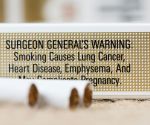The answer to that question is a resounding yes! Nicotine is an addictive substance inhaled through cigarette smoke. It gives the initial rush or calm when you first inhale. Addiction to nicotine is as pervasive and difficult to stop as other drugs. It's just legal and therefore easier to access.
Along with the addiction, smoking also has other devastating effects on the cardiovascular system, the development of cancers, etc. to the smoker and those around them. Because so much is now known publicly about the harms of tobacco smoking, its social acceptability is dropping as well. There are laws in many jurisdictions limiting where and when smoking permitted to protect the health of bystanders from second hand smoke.
Continue Learning about Quit Smoking
Important: This content reflects information from various individuals and organizations and may offer alternative or opposing points of view. It should not be used for medical advice, diagnosis or treatment. As always, you should consult with your healthcare provider about your specific health needs.





